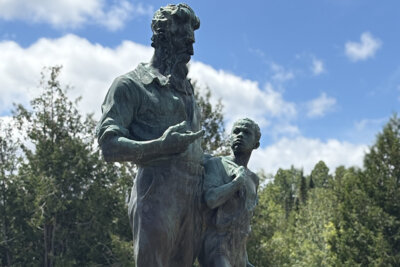Around Town: Sept. 18
Condolences
Jackson Joshua Walter Clemmons
Dr. Jackson Joshua Walter Clemmons passed away peacefully in his sleep on Sept. 10, 2025, at his home in Charlotte, Vermont, with family and friends watching over him. He was 102 years old.
Jackson was born in Beloit, Wisconsin, on March 24, 1923, the son of Henry and Ora Bell Clemmons. His family’s history reflected both hardship and resilience: his maternal great-grandfather had been enslaved in Mississippi, and his grandparents joined the Great Migration to the Midwest in 1914. His maternal grandfather, Walter Bell, a master painter and carpenter, taught young Jackson those trades.

Meanwhile, his paternal grandfather, J.J. Clemmons, who was originally from Martinique, was a University of Chicago law school graduate. In 1917, he founded and served as the principal of the JJ Clemmons High School, the first school for African American children in Washington County, North Carolina.
Jackson’s father, a graduate of Hampton Institute (now Hampton University), worked for the railroads and opened a hat shop and laundromat in Milwaukee, Wisconsin, with his mother, Ora. Their shop was located next door to the offices of the Milwaukee Journal, whose reporters frequented the business. The reporters gave Jackson their expired rolls of film, sparking his early passion for photography. Jackson learned to shine shoes and make hats, and with the tips he received from his parents’ customers, he purchased his first camera. When he was not working or studying, Jackson enjoyed drawing — an interest his mother, Ora, gently encouraged.
Jackson attended the University of Wisconsin–Madison to study agriculture, but his education was interrupted by World War II. Drafted into the military, he served in the Philippines before eventually returning to UW-Madison to complete his bachelor’s in agriculture (1948), his master’s in biochemistry (1949) and his doctorate in biochemistry (1956). He was the first African American student in the university’s biochemistry department.
Working alongside his mentor, Dr. Karl Paul Link, Jackson contributed to the development of a series of anticoagulants, including what is now known as d-CON (a popular brand of rat poison), Dicoumarol and Warfarin, a groundbreaking prescription anticoagulant that reduces the risk of blood clots, saving countless lives worldwide.
Jackson Clemmons was awarded prestigious postdoctoral fellowships, including two from the American Cancer Society and a highly competitive Helen Hay Whitney Fellowship. He continued his research at the Karolinska Institute of Biophysics and Cell Research in Stockholm, Sweden, and at the Sloan Kettering Institute for Cancer Research in New York City.
During his graduate studies in Wisconsin in the 1950s, Jackson met the beautiful Lydia Monroe, a nurse anesthetist. He asked her to marry him on their second date, but she insisted he wait a year and ask again. He did, and on Dec. 26, 1952, they married in her parents’ home in Harvey, Illinois.
After completing his doctoral studies, Jackson pursued medicine at Case Western Reserve University School of Medicine in Cleveland. The university rescinded his financial aid package, apparently after learning that Jackson was African American. Jackson and Lydia refused to give up. For four years, they worked multiple jobs while he continued his studies and lived on a frugal diet that consisted primarily of oatmeal, canned baked beans and chocolate bars. In 1959, Jackson completed his medical training and earned his M.D.
In 1962, Dr. Clemmons joined the University of Vermont Medical College as a pediatric pathologist and professor — the second African American on its faculty. Over decades, he taught several thousand students, mentoring many, especially students of color. He was prolific in publishing his scientific research and served as an advisor to the National Institutes of Health and the U.S. Department of Housing and Urban Development. Drawing on the carpentry skills he had learned from his grandfather, he often designed and built his own laboratory equipment. As both a civil rights advocate and a pediatric pathologist, Jackson saw the links between social inequities and child health outcomes, and often did public speaking, writing and advocacy about the need to integrate social justice into the teaching and practice of medicine.
With his wife, Lydia, Jackson shared a love of travel and discovery. Their honeymoon in 1953 was a cross-country trip to visit Lydia’s sister in Los Angeles. Jackson’s mother, who had lost her husband the previous year, accompanied them. They made the trip during the Jim Crow era of legal racial segregation. Since safe lodging was not guaranteed, they camped all the way from Illinois to California. Later, they traveled to Sweden and New York City during Jackson’s research fellowships, and in 1962 they drove from Ohio to Vermont in their 1950s emerald-green MG to relocate for his new appointment at the University of Vermont Medical College. Much to the chagrin of their families, friends and colleagues, rather than buying a modern urban home, they invested everything they had to purchase a historic 148-acre farm in Charlotte.
Within his Vermont community, Jackson became deeply involved in education at the local level. He served as co-president of the Charlotte Central School PTA with his wife Lydia, and as vice chair and later chair of the Champlain Valley Union High School board, where he worked to improve educational opportunities and foster inclusivity for all children.
Beyond his passion for his work and serving his local community, Jackson loved to travel. He carefully researched and curated trips to Africa, where he and his wife traveled and volunteered in hospitals across the continent over a span of nearly 20 years.
In the 1980s, they founded Authentica African Imports, then one of the only exclusively African retail mail order and import businesses in the country. While his wife Lydia managed the daily operations, Jackson repaired the African art and artifacts, built display bases for sculptures and masks and joined her in sourcing art across the continent.
Dr. Clemmons was also a farmer and environmentalist. For over 60 years, he resisted development pressures on his family farm in Charlotte, and instead, restored the farm’s historic buildings, invested in planting thousands of pine trees in the farm’s forest and taught his children how to cherish and cultivate the land. Jackson shared his love of photography and drawing with his family, taking thousands of photos over the years and helping his children to create beautiful woodblock prints of the farm and of African art and imagery. Inspired by his experiences across America, Europe and Africa, he dreamed of transforming the farm into a foundation and a place of teaching and multicultural exchange. His home and farm were always open, creating a welcoming space for students, artists and visitors from around the world.
In 2023, at the age 100, Jackson and Lydia secured their legacy by selling their beloved farm to the nonprofit they inspired, Clemmons Family Farm, Inc., ensuring its preservation as a center for African American heritage, art, farming and multicultural community building.
After having lived a very full life, Jackson is now reunited with his beloved wife Lydia, who predeceased him in August 2024. He leaves behind their five children — Joshua, Lydia, Laura, Jocelyn and Naomi — 12 grandchildren, extended family in Wisconsin, Maryland and California and a global community of students, mentees and friends who loved and admired him.
A community celebration of life will be held at the Clemmons Farm in spring 2026. In lieu of flowers, tax-deductible donations may be made to the JJ Clemmons Alumni Association in North Carolina, which will use the funds to support a Roper High School student scholarship program. Please make checks to: “Washington County African-American Museum and Cultural Arts Center” and write: “JJ Clemmons Alumni Association” in the check memo.
Mail to:
Washington County African-American Museum and Cultural Arts Center
P.O. Box 698
Roper, NC 27970
Related Stories
Popular Stories
If you enjoy The Charlotte News, please consider making a donation. Your gift will help us produce more stories like this. The majority of our budget comes from charitable contributions. Your gift helps sustain The Charlotte News, keeping it a free service for everyone in town. Thank you.
Andrew Zehner, Board Chair








